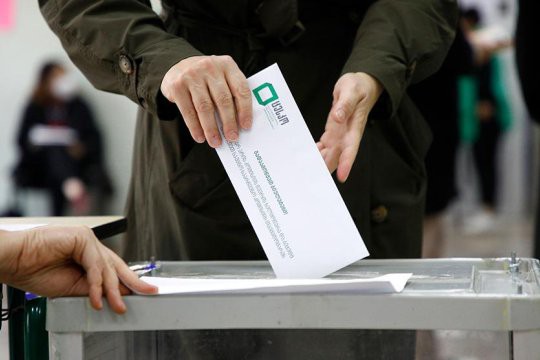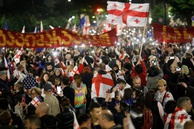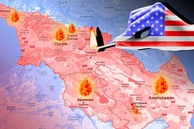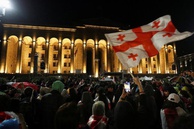Party Platforms ahead of elections
Settling the conflict with Russia is one of Georgia’s top priorities in the coming years. A statement to that effect was made by Georgian Prime Minister Irakli Kobakhidze, as he presented[1] the ambitious election program of the ruling party "Georgian Dream - Democratic Georgia" (GD).
The GD, which has been in power for 12 years, is seeking a fourth consecutive victory in the upcoming parliamentary elections on October 26th. Its main opponent, as in the previous elections, is the "United National Movement" (UNM), founded by Mikheil Saakashvili, which serves as the core of the opposition coalition "Unity - National Movement."
During the presentation, Kobakhidze outlined Georgia's current economic indicators and those projected for 2028, assuming peace and development rates continue. He also compared these indicators to those under Saakashvili, before the GD came to power.
The achievements are undoubtedly impressive[2]. In 2012, the nominal gross domestic product was at 27.9 billion lari[3]; in 2024, it reached 90 billion lari, and by 2028, it is projected to increase to at least 130 billion lari. The state budget in 2012 was 8.5 billion lari, in 2024 – 28 billion lari, and by 2028, it will exceed 50 billion lari.
Kobakhidze also presented data reflecting the social welfare of the population. In 2012, Georgia ranked 109th in the world in terms of purchasing power[4] parity ($10,040). In 2024, this indicator increased to $25,250, moving the country to 77th place. By 2028, the GD promises to increase this indicator to $36,000.
In addition, in 2012, the average salary was 712.5 lari, in 2024 – 2005 lari, and by 2028, it will exceed 3500 lari. Unemployment in 2012 was 26.7%, in 2024 – 13.7%, and by 2028, it will fall to 4%. The poverty rate in 2012 was 30%, in 2023 – 11.8%, and by 2028, it is predicted to drop to 4%.
Beyond the economy, the GD's election platform focuses on the protection of traditional values and support for the Georgian Orthodox Church (GOC), which is the religion of over 80% of Georgian believers. The ruling party leadership even proposed in August to enshrine the status of Orthodoxy as the state religion in the Constitution or to include the concept of Orthodoxy as a pillar of the Georgian national identity.
The GD's electoral program contrasts favorably with the program of its competitors from the UNM, most of which are based on the idea of financial dependence on the European Union. The UNM program explicitly states that if it comes to power, the Movement hopes to gain access to a €14 billion European fund. They believe that these funds will allow them to meet the needs of citizens. In other words, the UNM plans to literally shift the responsibility for increasing salaries, pensions, and social benefits in Georgia onto the EU, without any guarantees from the latter. At the same time, the opposition movement openly states that it is acting as a mere intermediary between the West and the Georgian people and will rule in Georgia as a temporary Western administrator. Furthermore, the opposition does not demonstrate particular commitment to the traditional values of the Georgian people, which could also cost it votes.
Meanwhile, there is no doubt that there will be those who, cashing in on Western grants, will vote for the UNM. This is because for 20 years, agents of influence (according to various sources, there are 10,000 to 30,000 NGOs[5] operating in Georgia) have been inculcating into young fledgling minds the idea that "the West will help us" and that "Russia will fall apart," and that obtaining a Western grant is the main indicator of success. For them, being a foreign agent of the US or the EU is an honor, but they shouldn't be agents of influence for Russia. It is primarily the young who directly responded to the "law on foreign agents," participated in protests at the call of pro-Western NGOs and will likely vote for the UNM.
The GD's electorate consists of residents of the Georgian countryside, public sector employees, and people of middle and retirement age. They are more likely to show up at the polling stations on October 26th and vote for the ruling party, as public sector salaries, even though insignificantly, are regularly increased, and the general population does not have many reasons to be dissatisfied with the government.
Electoral Ratings as a Tool for Manipulation
The main intrigue of the elections lies in whether the GD can retain its simple majority in parliament or achieve a constitutional majority (as in the 2016 elections), which its leaders clearly aim for. The ruling party is persistently convincing voters that in order to fulfill all of its promises, based on constitutional amendments, it needs a constitutional majority[6].These promises include, in particular, the recognition as unconstitutional of the former ruling party, the UNM, founded by ex-President Mikheil Saakashvili, and associated organizations. In addition, there are plans to launch a number of criminal investigations, including for the attack on Russian peacekeepers and South Ossetia in 2008. By doing so, the GD eliminates the possibility of the West putting pressure on the government through proxy actors and thereby forces it to interact directly only with the legally elected parliament and the government it appoints.
According to the latest poll by the GORBI[7], International Public Opinion Research Center, conducted for the "Imedi" TV channel in late September, the GD's rating stood at around 60%. The coalition of three parties "Unity - National Movement" was supported by 13.6% of respondents, while the rest are unlikely to cross the 5% threshold.
At the same time, according to a sociological survey conducted in late September by the American sociological agency Edison Research for the opposition "Formula"[8], TV channel, allegedly 33% of voters will vote for the GD, which is still more than for any opposition party (19% for the UNM). Together, the opposition parties, according to this clearly biased survey, could receive about 55% of the votes, which would allow them to form a technical coalition government. However, the experience of previous elections shows that the GD usually receives 1.5 times more votes than opposition ratings[9]. predict. The goal of such "studies" is simple: to instill confidence in supporters of the radical opposition that their ratings are growing while the ruling party's ratings are declining.
The contradictory results of the surveys are explained by the political orientation of the research clients. The Edison Research survey was commissioned, and therefore paid for, by the opposition Formula TV company. The reliability of such surveys is highly questionable and their value is rather relevant only in connection with their wide scope and the possibility to manipulate public opinion and, ultimately, incite mass protests
Genuine masters of “objective monitoring” of voter sentiment - the specialists from the American NGO International Republican Institute (IRI, hereinafter – a non-commercial organization declared unwelcome in the Russian Federation) - usually announce ratings, survey results, including during the elections, well beforehand, confirming or denying official voting results.
For example, the 2008 Georgian presidential elections were "grossly and deliberately falsified," as the then head of the OSCE observer mission, German diplomat Dieter Boden, said[10]. Around 110,000 votes – almost 6% of the total votes – were attributed to Saakashvili. It was for the first time that the head of the OSCE mission and concurrently the head of the Office for Democratic Institutions and Human Rights made a statement completely at odds with Washington's assessments.
However, a group run by Senator J. McCain (then-chairman of the IRI, now deceased), consisting of high-ranking American politicians and officials, lobbyists, NGO leaders, and journalists, organized[11] the necessary US reaction to the gross falsifications and violations of democratic norms. During their operation to "cover" Saakashvili's regime and legitimize the election results, the official position of the United States was to agree with their results and recognize them as democratic and fair.
In the 2012 Georgian elections, this tactic did not work: even though the IRI again predicted victory for the "United National Movement" and persuaded wavering voters, Saakashvili's party failed.
Similarly, the IRI "worked with public opinion" in other countries. For example, in December 2013, Senator McCain personally visited Kyiv to advise the leaders of the Maidan on manipulating public opinion.
Currently, 20 "long-term observers" from the IRI alone are monitoring the pre-election processes in various regions of Georgia, starting from July 19th. There is no doubt that their manipulations and "predictions," along with those of other Western "sociologists," will determine whether radical protests with demands for vote recounts will begin.
International Recognition of Elections
In this regard, the question is not whether "Georgian Dream" will win the elections, but whether the opposition, and most importantly, the US and the EU behind it, will recognize the victory. International recognition of elections has suddenly come to the forefront of the political agenda, considering that, at first glance, they represent a purely internal procedure closely related to the state's sovereign independence.
In recent years, there have been increasing cases where the West, for well-known reasons, does not recognize elections if it does not like the results. We are talking about unequivocal support for the course of replacing uncontrollable power in countries. For example, the European Union, the US, and the UK refused to recognize the results of the 2014 presidential elections in Syria, despite the presence of independent observers from more than three dozen countries[12].
In Venezuela, the speaker of the legislative assembly and opposition leader Juan Guaidó declared himself president after the country's opposition refused to recognize the results of the 2018 presidential elections, which were won by the incumbent president, Nicolás Maduro[13]. Guaidó, in the status of "temporary president," was officially supported by the US, the UK, Australia, and the European Union. In the 2019 Bolivian presidential elections, the incumbent president, Evo Morales, who had led the country since 2005, won in the first round. Nevertheless, the US, Colombia, Argentina, and Brazil refused to recognize the election results and demanded a re-election. Following mass protests and a military coup, Senator Jeanine Áñez declared herself interim president of Bolivia. Evo Morales was forced to leave the country and flee to Mexico, which granted him political asylum[14].
In the post-Soviet space, the 2020 Belarusian presidential elections became a disturbing example. The incumbent president, Alexander Lukashenko, received 80% of the vote, while his main opponent from the opposition, Svetlana Tikhanovskaya, received only 10%. Nevertheless, the US and the EU declared the elections "rigged" and, as expected, did not recognize the results. True, they failed to remove Alexander Lukashenko from power, unlike Evo Morales with the help of a coup, but this does not mean that such an attempt will not be made in Georgia.
Why "Georgian Dream" Dared to Challenge the West
For the first eight years of its rule, "Georgian Dream" tried to position the republic as a sovereign European country that only needs to carry out a number of democratic reforms to be admitted into the EU. Thanks to the pragmatism of the ruling party, economic cooperation and regular air travel were restored with Russia, which had a significant positive impact. Most of Georgia's population experienced firsthand how profitable it is to trade with Russia. Tbilisi did not impose any anti-Russian sanctions from the very beginning of the sanctions pressure on the Russian Federation in 2014 and did its utmost to minimize its participation in Western restrictions.
At the same time, the GD maintained a course towards Euro-Atlantic integration: it signed documents on Georgia's European Association in 2014; in late 2017, it incorporated into the Constitution the state's obligation to do everything possible to join the EU and NATO; it supported a French citizen, the former head of the Saakashvili Ministry of Foreign Affairs, Salome Zourabichvili, in the 2018 presidential elections. In terms of democratic reforms, Georgia surpassed not only other post-Soviet EU candidates but also a number of existing EU members. However, this was clearly not enough for the collective West. It expected the GD to become the successor of Saakashvili's party, playing a manageable role in anti-Russian geopolitical projects. In reality, the continuation of democratic reforms is only a formal requirement for EU candidates. It is no secret that the EU will readily tolerate almost any form of government if the country demonstrates political solidarity with European directives at the international level.
The inconsistency between the GD's policy and the goals and plans of the collective West became particularly apparent in early 2022, when Georgia refused to open a second front and impose sanctions against Russia, as this "harms the country's economy and violates the interests of the Georgian people»[15] Then, the Western curators of the Georgian project came to the conclusion that it was necessary to return the UNM and M. Saakashvili to the leadership of Georgia, getting rid of the GD and its founder, Bidzina Ivanishvili.
According to Georgian intelligence, in the autumn of 2023, they prevented an attempt to launch the Ukrainian scenario and repeat the Kyiv "Euromaidan" of 2013-2014 to ensure that Georgia does not deviate from the path of Euro-Atlantic integration and does not leave the US sphere of influence. The Georgian Ministry of State Security accused USAID (US) of preparing a coup[16]. In July of this year, Georgian intelligence reported that it had thwarted the preparation of an assassination attempt on B. Ivanishvili, which was to be carried out by Georgian militants who had arrived from Ukraine and fought on Kyiv's side.
The Georgian authorities recorded covert financial injections from Western funds into thousands of pro-Western NGOs to mobilize the opposition for radical protests in order to simulate a "political crisis" in the republic.
The instinct for self-preservation prompted the GD to initiate the "Law on Transparency of Foreign Influence" (law on foreign agents) in response, to identify the scale of foreign states' interference in Georgia's internal politics through the funding of opposition media and NGOs, and to compile a unified register of all foreign agents.
The adoption of the law on foreign agents disrupted the West's plans to actively interfere in the October parliamentary elections in Georgia and reformat the country’s government so that it would be fully under control and agree to the deadly for Georgia opening of a second front against Russia in Transcaucasia. However, the GD did not take into account the extent to which Western states disregard international law and any norms when their interests are involved.
Iuppiter iratus ergo nefas[17]
Paraphrasing the famous Latin saying, one could say: "West, you are angry – therefore, you are wrong." The West is "angry" in earnest and has already made it clear that it will not put up with it and will not tolerate it if the Georgian leadership does not succumb to its will.
The media has jumped into action. The British publication The Guardian is sounding the alarm[18]: the Georgian government is turning towards Russia, and the October elections could be its last chance to clear its path to the EU. Tiny Georgia, it turns out, is a "microcosm of the struggle for liberal democracy in the West." The article's author calls for action: "Democracy must be saved and supported in the young and still weak democratic state next to Russia. Otherwise, it will collapse." The other equally authoritative British publication, Financial Times, definitely not lagging behind in manipulating public opinion, alleges[19] that "the overwhelming majority of Georgians" (polls say the opposite – note by the author) do not want the "Georgian Dream" to win the elections and that the warning[20] by the Director of the Russian Foreign Intelligence Service, Sergei Naryshkin, that "in the event of the opposition's defeat in Georgia, the US plans a coup d'état," is "absurd." (As if we didn’t witness a string of "color revolutions" inspired by the West in recent years – note by the author). At the same time, the Financial Times is predicting in advance that "the 'Georgian Dream' will not be able to win, although it will still claim to do so, provoking angry demonstrations and even violence." Having conducted an "artillery preparation" with the help of the mass media, official figures have stepped in. US Secretary of State Antony Blinken stated that due to the adoption of the law on foreign agents in Georgia, Washington will suspend its aid program worth over $95 million. For the same reason, the EU has passed a decision[21] to freeze €30 million that was planned to be allocated to the Georgian Ministry of Defense. Brussels and Washington accused Tbilisi of "undermining democracy," failing to comply with European values, and threatened to impose sanctions, block Georgia's "Euro-Atlantic perspective," deprive it of candidate status for EU membership, and suspend visa-free travel for citizens of the country.
The US Congress has prepared[22] the Megobari Act (from the Georgian word "megobari" – "friend"), which provides for two scenarios for developing relations with Tbilisi. First: if power changes as a result of the elections, Georgia will be granted visa-free travel and a free trade zone. The second scenario, however, envisages the imposition of severe economic and financial sanctions if the "anti-democratic" course is maintained. Just like that – no mincing words, just threats. The EU ambassador to Georgia, Pavel Herczynski, also "democratically" threatened[23] Georgia with isolation following the Belarusian scenario if the ruling party, Georgian Dream (GD), wins the elections. IN turn, the European Parliament adopted[24] a resolution (which, however, has no legal force and is symbolic by nature) "On the Decline of Democracy and Threats to Political Pluralism in Georgia." The resolution strongly criticizes the recently enacted laws on "foreign agents" and the prohibition of LGBT propaganda, as well as the pre-election banners of the ruling party and its positive assessment of Sergey Lavrov's statement about Russia's readiness to facilitate reconciliation with Abkhazia and South Ossetia.
In the context of these events, members of European Parliament urge the EU to freeze funding for the Georgian government amounting to €121 million until the laws are abolished, to reconsider the visa-free regime, and to impose sanctions against the founder of the ruling party, B. Ivanishvili. They also call for the release of former President M. Saakashvili and urge Georgia, as a candidate country for EU membership, to slap sanctions on Russia. However, GD economists immediately calculated the consequences of anti-Russian sanctions for Georgia which would lead to a "10% decline in the economy, and for a pessimistic scenario, an 18% decline, leading to economic collapse[25]." According to estimates, Georgia would lose at least 14 billion lari (more than $5 billion)[26].
In essence, MEPs stated that the elections can only be considered "legitimate and democratic" if the GD ensures a peaceful transfer of power to the United National Movement (UNM) of former President M. Saakashvili. Any other election outcome will be deemed illegitimate.
Naturally, the ruling party dubbed[27] the resolution an interference in the election process. However, such interference has become widespread. Over the past month, foreign politicians have made over 90 critical statements regarding Georgia against the backdrop of an active election campaign. "There are 3-4 statements every day, which shows that this is a planned campaign," said[28] the Speaker of Parliament, Sh. Papuashvili. He also noted that "the actions of local NGOs funded from abroad show that... they do not recognize the elections. My appeal to everyone: please be fair and acknowledge the choice of the Georgian people."
Western propaganda deliberately tries to mislead the public by claiming that the GD is guided by a "pro-Russian" policy. In order to preserve itself and counter unprecedented pressure from the US and the EU, the ruling party had to make a U-turn, not towards Moscow, but towards regaining its sovereignty. The GD is acting in accordance with the national interests of the republic, largely due to the negative experience of Euro-Atlantic integration. Russia welcomes the national-oriented, pro-Georgian policy of the country's leadership, as any independent state should do.
The upcoming parliamentary elections in Georgia will inevitably become a serious test for the country: a new "color revolution" is almost inevitable, possibly with the use of weapons, according to the Ukrainian scenario. If the GD successfully navigates this period of instability, it will truly take power in the country and will be able to pursue a balanced foreign policy: establishing the necessary distance from the US and its satellites while simultaneously engaging in fruitful cooperation with Russia, China, Turkey, and other states.
***
[1] https://tass.ru/mezhdunarodnaya-panorama/22064977
[2] https://sputnik-georgia.ru/20241007/proshloe-nastoyaschee-i-buduschee---obeschaniya-gruzinskoy-mechty-pered-vyborami-290239968.html
[3] Lari rate against the US dollar for October 14: 2,7263 GEL/$1
[4] GDP (taking into account the purchasing power parity) per capita
[5] https://vestikavkaza.ru/news/vlasti-nazvali-realnoe-kolicestvo-npo-v-gruzii.html
[6] Constitutional majority in Georgia is a majority that holds at least three fourths of the mandates in parliament (113 out of 150). This number of deputies makes it possible to make amendments to the Constitution. In the present parliament, the Georgian Dream has 83 mandates
[7] https://sputnik-georgia.ru/20241008/imedi-opublikoval-reytingi-partiy-v-preddverii-vyborov-v-parlament-gruzii-290255994.html
[8] https://formulanews.ge/News/117949
[9] https://caliber.az/post/politicheskij-rasklad-smozhet-li-oppoziciya-brosit-vyzov-gruzinskoj-mechte
[10] https://www.inopressa.ru/article/10Jan2008/fraktuell/georgia.html
[11] https://history.wikireading.ru/347296
[12] http://www.cikrf.ru/activity/relevant/detail/30364/
[13] https://dzen.ru/a/Y6W79pI6nlXClo0_
[14] https://www.fondsk.ru/news/2019/11/13/kto-stoit-za-gosudarstvennym-perevorotom-v-bolivii.html
[15] https://am.sputniknews.ru/20220301/tbilisi-ne-stal-vvodit-sanktsii-protiv-moskvy-pochemu-eto-khorosho-dlya-erevana-39210350.html
[16] https://eadaily.com/ru/news/2023/10/03/metody-samanty-gruzinskie-specsluzhby-razoblachili-serbskih-podryvnikov-iz-usaid
[17] Iuppiter iratus ergo nefas – a Latin saying (Jupiter, you are angry, therefore you are wrong)
[18] https://www.theguardian.com/commentisfree/article/2024/jul/15/georgia-russia-west-democracy-elections-eu
[19] https://www.ft.com/content/fe13da0d-07dc-41f6-9eef-673be6351a72
[20] https://tass.ru/politika/21698897?ysclid=m26r7t75hd810926357
[21] https://www.rbc.ru/politics/09/07/2024/668cdf949a79471d32956093
[22] https://civil.ge/archives/609543
[23] https://vz.ru/news/2024/10/4/1290703.html
[24] https://eadaily.com/ru/news/2024/10/09/tbilisi-rezolyuciya-evroparlamenta-po-gruzii-pozornaya-i-otvratitelnaya
[25] Introduction of sanctions will have no influence on Russia, but will lead to a change of power in Georgia – Prime Minister - 11.10.2024, Sputnik Georgia (sputnik-georgia.ru)
[26] https://ria.ru/20241013/gruziya-1977626312.html
[27] (https://t.me/SputnikGeorgia/39267)
[28] https://t.me/SputnikGeorgia/39289
read more in our Telegram-channel https://t.me/The_International_Affairs

 12:31 18.10.2024 •
12:31 18.10.2024 •



























